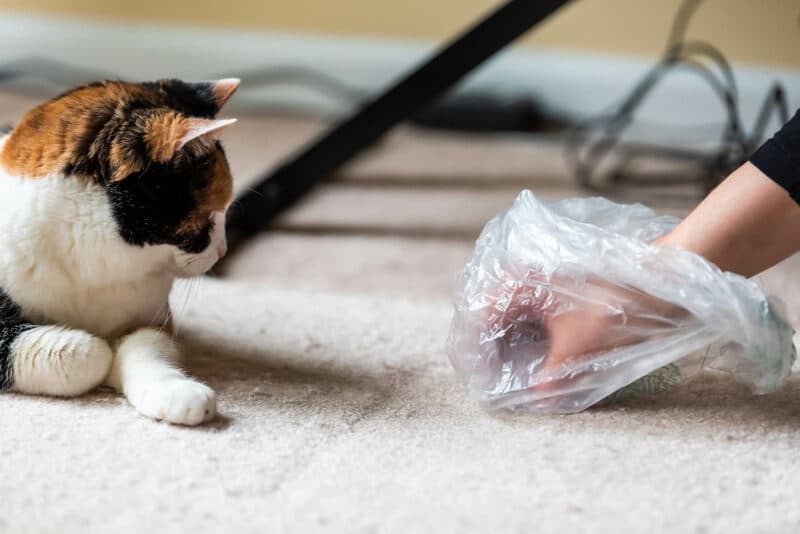Our cats are known to be fastidious creatures, and it can be disconcerting when you find your beloved pet pooping on the floor. Cats are typically good at using their litter boxes, and if your cat is a senior, you would expect them to continue using it correctly.
However, as your cat ages, there are several reasons that they may suddenly start eliminating on your floors and rugs. Knowing why your cat is pooping outside of their litter box can help you get to the root of the problem.
The 9 Reasons That Your Senior Cat Is Pooping on the Floor
1. Medical Condition
Several medical conditions could lead to your cat pooping on the floor. Something like constipation can cause your cat to associate any pain or discomfort that they experience with the litter box, so they choose to poop elsewhere.
Conversely, if your cat has diarrhea, they might not make it to the litter box in time and end up pooping on the floor. There are also various health conditions, such as inflammatory bowel disease (IBD), that can lead to poop issues, including:
- Intestinal tumors
- Muscle and joint issues
- Arthritis
- Food allergies
- Poor vision/blindness
- Thyroid problems
- Liver conditions
- Dementia
- Musculoskeletal injuries
If your cat was using their litter box as usual and suddenly stopped, you should take them immediately to your vet to rule out any medical conditions.
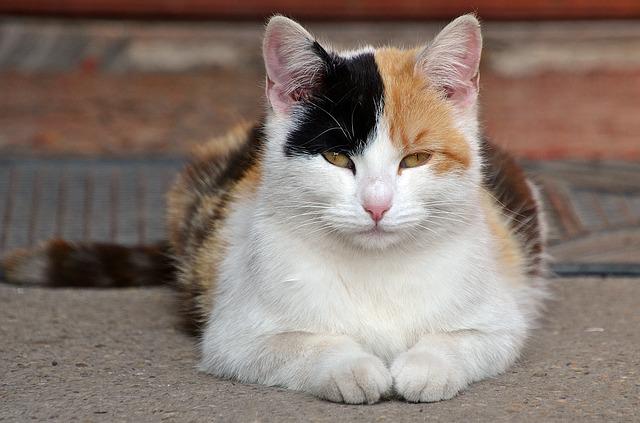
2. Stress
Some cats handle changes in the household better than others. If things have recently changed, a senior cat might have more trouble coping, particularly if they have a nervous temperament already.
Disruptions in the home, such as new people moving in, renovations, or a new pet, can cause stress for most cats, and pooping on the floor could be the result. Usually, your cat will adapt (with your help). They will likely start using the litter box again, but see your vet if the behavior continues.
3. The Litter Box
Sometimes, the litter box is the issue. Litter boxes should be about one and a half times the length of your cat. They should be able to stand at their full height and comfortably turn around. If you’ve recently changed your cat’s litter box and the pooping on the floor seems to have happened soon after, it’s likely that your cat doesn’t like the new box.
If it’s a covered box, some cats prefer something that isn’t enclosed, or if it’s an automatic litter box, some cats might be put off by the sound and movement of the mechanics. Most importantly, if it has high edges, it might be too difficult for your cat to get into, particularly if your senior cat has arthritis or mobility issues.
Aim for a litter box with low sides that is easier for your cat to get into. You might have to clean up the litter that will get kicked out frequently, but it might allow your cat to use the box again, and no more poop on the floor will be worth it. Try investing in a good litter mat that can catch some of the excess litter.
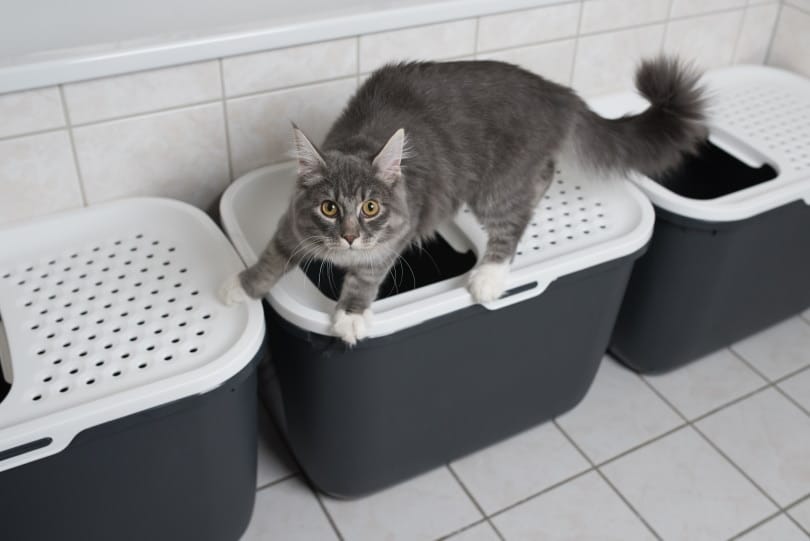
4. Litter Box Location
This isn’t a likely option if you haven’t moved the litter box recently, but if you have, the new location may be irritating your cat. Some cats might find it stressful if it’s in an area that could be considered busy, such as close to the front door or next to the washer and dryer.
You should ensure that your cat’s litter box is in a quiet and private location and that they can be left in peace while using it. This means no other pets, children, or adults should bother the cat while they’re using the litter box.
5. The Litter
If you’ve changed the litter recently, it could be an issue. Most cats prefer litter that is similar to sand since they descended from desert-dwelling cats that would bury their waste in the sand. If the texture of the litter bothers your cat, they might prefer pooping on your floor.
Additionally, ensure that you only use unscented litter; cats have a sensitive sense of smell and don’t enjoy strong fragrances, particularly in their litter boxes. The litter should be a minimum of 3 inches deep, and if you previously used plastic liners, try going without, as your cat might not appreciate the sound and texture of the bag under the litter.
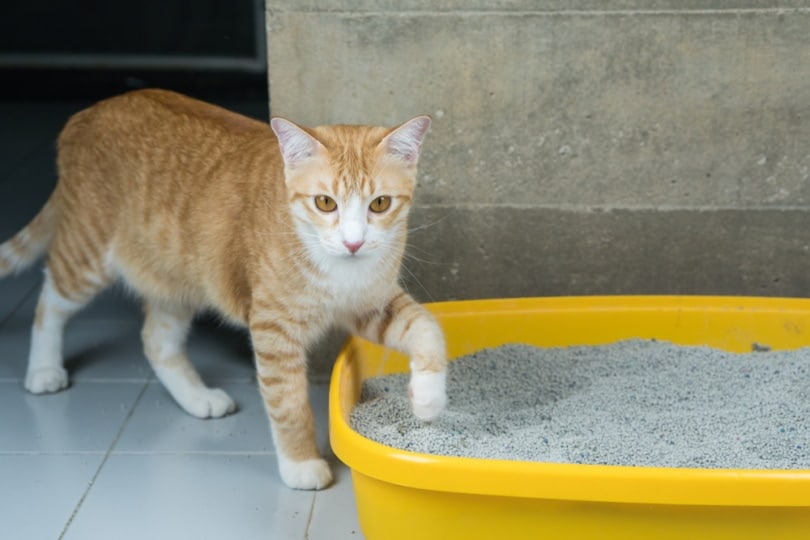
6. Cleanliness
If you haven’t cleaned your cat’s litter box often enough, they might avoid it. Litter boxes should have the waste scooped once a day. Some cat parents scoop every time their cat uses it.
Once a month, the entire litter box should be dumped out, cleaned, disinfected, and then filled with clean litter.
7. New Cat
If you’ve recently adopted a senior cat, pooping on the floor could be a reaction to the stress of the change in their environment. It might take a few weeks for your cat to readjust to their new home.
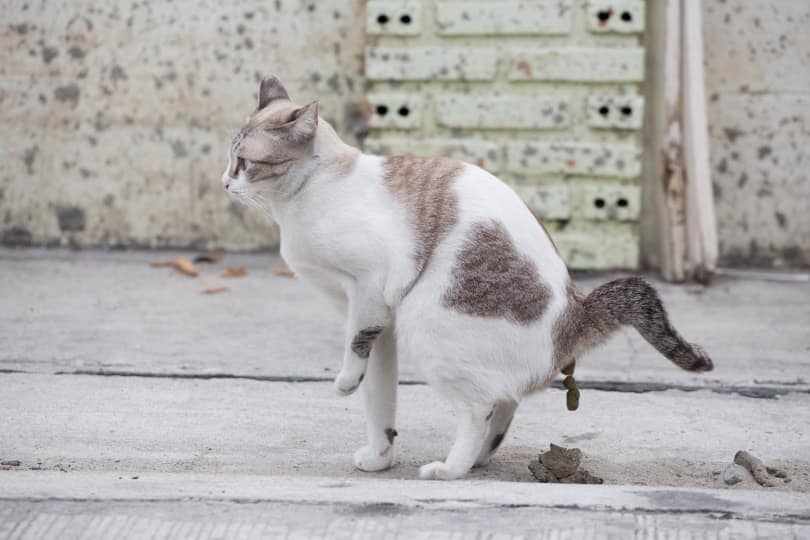
8. New Pet
If you’ve recently introduced a new dog or cat to your household, your elderly cat might be pooping on the floor in response. New cats, in particular, can trigger territorial behavior from the resident cat, which can result in spraying and pooping around the home.
Make introductions gradually, and ensure that your senior cat is safe at all times, with an escape route if needed. If a new neighborhood cat is roaming around, it can also bring up stress and territorial behavior from your senior cat.
9. Enough Litter Boxes
If you have a multi-cat home, you should have enough litter boxes. You need one litter box for each cat, plus one more. So, if you have one cat, you need two litter boxes, but three litter boxes are required if you have two cats.
Each litter box should be placed apart from each other. If you have two levels in your home, it’s a good idea to have at least one box upstairs and the others downstairs, especially your elderly cat’s box.
If you only have one cat, they might still prefer multiple litter boxes; some cats prefer to urinate in one and defecate in the other.
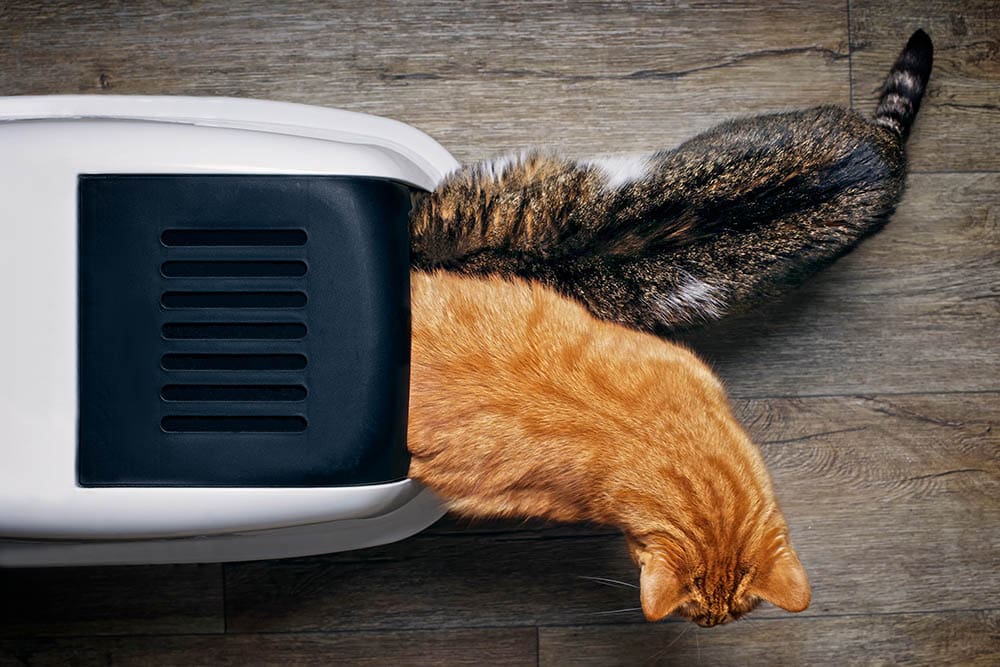

A Few Solutions
Watch your cat around the litter box. Sometimes, you can determine what the problem is through observation. For example, most cats typically spend a while burying their poop, but if your cat dashes in and out of the litter box, the problem might be the litter.
Try placing a few litter boxes side by side with different litter. Whichever litter your cat seems to prefer should be the one to use. If your cat appears to prefer pooping just in your bedroom, make the room off-limits. Or, consider placing a separate litter box in that location.
Finally, try cleaning up the areas that your cat seems to be pooping on with an enzyme cleaner. It helps neutralize the odor and might prevent your cat from returning to that spot.
Conclusion
Don’t view your cat pooping on the floor or in your shoes or bed as devious behavior. More than anything, it’s a sign of distress. Medical problems, anxiety, and litter box issues are common motivators for inappropriate elimination.
Speak to your vet. They should be able to give you helpful advice and help rule out any medical problems.
Featured Image Credit: Kristi Blokhin, Shutterstock

